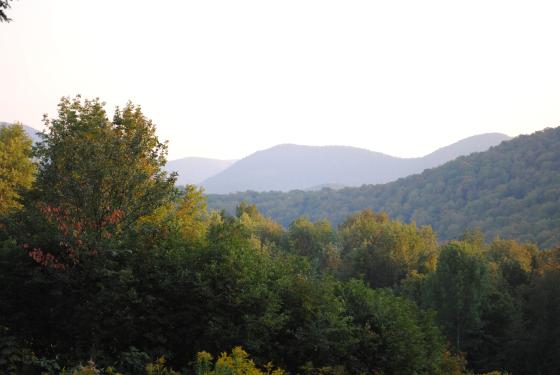Posted January 4, 2016 at 10:21am by Sophia Veltrop
Merck Forest works with Vermont Land Trust to Permanently Protect Land

Rupert -- This season of giving has brought a lasting present to those who enjoy Vermont’s landscape of forests and farmland. The Merck Forest and Farmland Center worked in partnership with the Vermont Land Trust to permanently protect more than 2,600 acres in Rupert, bringing the total number of protected acres to approximately 3,000. The formal conservation of the land ensures that Merck Forest’s long tradition of land stewardship, education and recreation will be continued in perpetuity.
The Merck Forest and Farmland Center (MFFC) is a nonprofit educational organization devoted to the sustainable management of its forest, the promotion of sustainable organic agriculture on its upland farm, and the education of local students in outdoor exploration and the study of natural sciences.
The land was protected with a legal tool called a conservation easement, which was carefully developed to reflect Merck Forest’s educational and recreational mission. An ecological assessment completed by the University of Vermont Field Naturalist Program helped the Merck trustees determine the best ways to protect the natural resources of the land as part of a long-range planning process. Along with thousands of acres of well-managed forest, wildlife habitat, and diverse natural features, more than 200 acres of quality farm soils were conserved.
With the abutting, privately owned conserved parcels, the easement creates a large, unbroken forest block. Negotiations are underway for the acquisition of an adjoining 160-acre woodlot, which if acquired and conserved by Merck, will create an unbroken connection to the Rupert State Forest. The resulting huge oasis of consolidated and protected lands will provide larger wild animals with long corridors for travel, and an expansive free territory in which to roam and flourish. It is hoped that the example of these private landowners will attract even more owners to conserve and connect their lands.
The Merck Forest Foundation was originally founded in 1950 as the Vermont Forest and Farmland Foundation on land donated by George W. Merck. The Foundation's pedigree in environmental stewardship has been long established, with Mr. Merck's family ties to Dr. Carl Alwin Schenck, founder of the Biltmore School of Forestry. The Biltmore School, founded in 1898 in North Carolina, was the first forestry school in the United States, and provided a theoretic foundation for the sustainable and scientific management of forests in this country.
“I like to think George and Uncle Allie [Dr. Schenck] are smiling at the good sense and wisdom of their heirs and assigns,” said Tom Ward, MFFC Executive Director. “By donating the development rights to the Vermont Land Trust, the trustees of the Merck have risen to the highest levels of stewardship, in my view. They did so after a thoughtful, two-year-long conversation with numerous professionals, stakeholders, and advisors, because it brings in a trusted partner to work with us in perpetuity to conserve this exceptional gift.”
Ward’s enthusiasm is matched by representatives of the Vermont Land Trust: Gil Livingston, President of the Vermont Land Trust, believes that the “Merck Forest-VLT collaboration is a wonderful example of our best work: connecting people to a special place, commemorating decades of exemplary natural resource stewardship, and safeguarding this legacy in the face of an uncertain future." Donald Campbell, VLT Southwest Regional Director, had words of praise for the MFFC Board of Trustees: “This project was a pleasure because Merck Forest put tremendous thought into it. Envisioning the organization’s future, their board voted unanimously to conserve the land for the sake of future generations.”
A unique feature of the Merck model is the close relationship of woodlands and farmland. Currently the forest sustains a 33-acre sugarbush, and produces hundreds of gallons of Vermont-Certified Organic maple syrup annually. It is a popular recreational destination year-round for local residents and tourists, who hike, snowshoe, cross-country ski, or ride horseback on its 30+ miles of trails, and who stay in rugged backcountry cabins, or visit the farm. The farm produces pork and lamb for sale, from animals that are pasture-raised and rotationally grazed. An active apprenticeship program trains new generations of farmers to address the changing demands of commercial agriculture and the innovations introduced as regional food systems become more robust.
